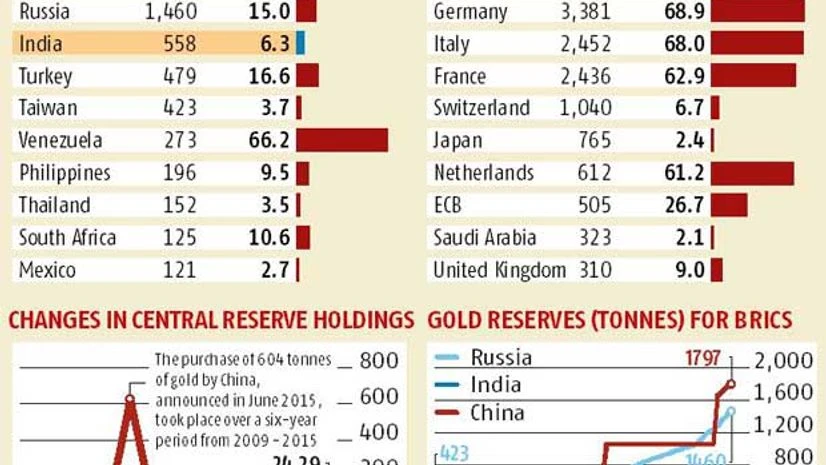A debate on whether the Reserve Bank should add more gold to its forex reserves started a few months ago when the government was finalising gold schemes, including sovereign bonds. Now Kenneth Rogoff, former chief economist of the IMF and Professor of Economics and Public Policy at Harvard University, has recommended central banks of emerging economies to increase the share of gold in gold reserves. He also argued that especially for Asian emerging economies, adding gold makes sense when markets are volatile.
If that is not enough for the RBI to get the signal, among BRICS nations Russia and China are most actively adding gold in forex reserves. Both are among the top 10 in countries holding gold. India last added 200 tonnes in November 2009 when it purchased gold auctioned by IMF. Brazil and South Africa are inactive so far as gold in currency reserves are concerned.
According to data from the World Gold Council, of the 15 emerging markets that have gold also in reserves, six have almost 10% or more gold in currency reserves. India has launched gold sovereign bonds and gold monetisation schemes and both put together are estimated to have collected gold or money worth 10 tonnes of gold. Bonds are proxy to gold. About 5 tonnes invested in gold is government borrowing and can be treated as gold reserves with the government and for that matter with the RBI, which is like a merchant banker for government borrowing.
At present, gold as part of forex reserves with the RBI is a little over 5% of reserves.
According to an official in the RBI, the central bank has not added gold to its reserves because the Indian economy has a trade deficit which is financed by capital flows. These are volatile, but come in the US currency and hence it is hedged by adding more dollars. So the need to have gold need not be a top priority. The official clarified this to be his personal view. Having gold to hedge against inflation is not that severe for India as it hardly has that kind of high inflation and India is broadly a fiscally prudent nation. Gold is the best diversification of reserves for high inflation nations with limited exports avenues.

More From This Section
The latest report by Natixis Commodities Research, says: “Several central banks diversify from dollar and into gold. Most of these banks were from emerging countries, particularly Asian banks that had previously increased their share of dollar assets during the Asian currency crisis.”
Gold is considered a better hedge for countries with depreciating local currency. Natixis analysis also says that there is another side of argument to gold in forex reserves. There is cost of storage involved and to lease out gold to earn returns in the form of lease rents, gold has to be stored away in London, Zurich or New York.
The report, however, argues that gold is the ultimate asset to hold in an emergency. It has often appreciated in times of financial uncertainty and is an accepted medium of exchange between countries.
It has no default risk. Gold can’t be printed or produced in unlimited amounts.
| Major emerging markets | Gold reserves (Tonnes) | % of reserves |
| China | 1,797 | 2.2% |
| Russia | 1,460 | 15.0% |
| India | 558 | 6.3% |
| Turkey | 479 | 16.6% |
| Taiwan | 423 | 3.7% |
| Venezuela | 273 | 66.2% |
| Philippines | 196 | 9.5% |
| Thailand | 152 | 3.5% |
| South Africa | 125 | 10.6% |
| Mexico | 121 | 2.7% |
| Korea | 104 | 1.1% |
| Indonesia | 78 | 2.9% |
| Brazil | 67 | 0.7% |
| Pakistan | 64 | 13.1% |
| Malaysia | 36 | 1.5% |

)
